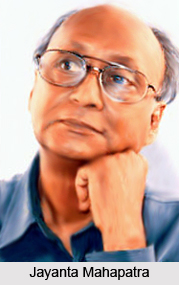 Jayanta Mahapatra was a popular Indian English poet. He also wrote in Oriya. The poet was born in 1928 in Cuttack and had spent most of his life time in the same city. During his life time most of the time he was engaged in teaching physics at Ravenshaw College. All through his life the great writer had authored 16 books on poems. Mahapatra was also part of the trio poets who laid the foundations of Indian English Poetry. The poet had not kept his talent limited to poems but he also tried his hands with prose.
Jayanta Mahapatra was a popular Indian English poet. He also wrote in Oriya. The poet was born in 1928 in Cuttack and had spent most of his life time in the same city. During his life time most of the time he was engaged in teaching physics at Ravenshaw College. All through his life the great writer had authored 16 books on poems. Mahapatra was also part of the trio poets who laid the foundations of Indian English Poetry. The poet had not kept his talent limited to poems but he also tried his hands with prose.
Mahapatra`s style of obsessive writing and hopeless search in the meaning of human condition is an important characteristic of post modernism. The basic problem that haunts the poems of Mahapatra`s is the relationship of the self with the other, the distance felt by the consciousness between being aware and what one is aware of. In Mahapatra`s poetry such feelings are intensified as he questions the existence of the self, the other often takes the form of local society and especially Hindu culture, ritual and spirituality, symbols and past from which he had been alienated by his grandfathers conversion to Christianity and his own English education.
Mahapatra observed his environment and listened quietly and sensitively to his inner feelings, the sources of his poetry brought momentary perception of relationships and fleeting images of contrast. It was difficult, obscure poetry of meditation recording reality as an unknowable flux. It more often deconstructed what was perceived. It was poetry of inner spaces, of psychology, of contradiction and renewed feelings of depression, guilt, desire, lust and attention. Many of his poems seemed sealed against interpretation.
It seemed from his writings that he had evolved his poetic style largely on his own as an intellectual act. The words which were used by Mahapatra became concepts and symbols. He had used symbols from his environment to articulate an inner space of feelings. In fact the titles of his poems are indicative of how the external world especially the Indian landscape and seasons became the starting point of his imagination.
Mahapatra`s poems recorded a distance between himself and the customs of his surroundings. In his poems there are the sounds of temple bells, the prayers of priests, the funeral pyres, the uncomplaining acceptance of the past, representing a possible reality or a mentality to which he did not belong. The listening and waiting were in fact result of consciousness of the rational mind which is aware of its individualization and difference. His poems keep returning to the desires to overcome such alienation through passive attention in the hope that some renewal will definitely occur. One of Mahapatra`s poems, "Listening" concludes with the words: "You merely wait, listening, pinned to the stone".
It can be said that Jayanta Mahapatra`s world is filled with personal pain, guilt, remorse, hunger, desire and moments of renewal, his environment is filled with symbols of beliefs by the ordinary lives of the people of Cuttack, the temples, the Hindu festivals and the monuments. The poems are varied attempts to bridge an epistemological, phenomenological gap to know, to be part of, to enclose and to experience with the world and other whether it is a woman, temple stone or a Hindu priest.
Some of the major literary works of Jayanta Mahapatra includes Close the Sky Ten by Ten, A Father`s Hours, A Rain of Rites, Burden of Waves & Fruit and a lot more.
The poet had also been honoured by a number of awards for his excellence in the field of literatures. The awards which he had received include:
•Second Prize International Who`s Who in Poetry, London, 1970
•Jacob Glatstein Memorial Award Poetry, Chicago, 1975
•Visiting Writer International Writing Program, Iowa City 1976-77
•Cultural Award Visitor, Australia, 1978
•Japan Foundation Visitor`s Award, Japan, 1980
Sahitya Akademi Award National Academy of Letters, New Delhi, 1981
•Invited Poet Asian Poets Conference, Tokyo, Japan, 1984
•Indo-Soviet Cultural Exchange Writer, USSR, 1985
•Resident Writer Centro Culturale della Fondazione Rockefeller, Italy, 1986
•Invited Poet University of Malaysia, Kuala Lumpur, 1988
•Singapore Festival of Arts, Singapore, 1988
•New Literatures in English Conference, Justus-Liebig-Universitat, Giessen
Besides these awards there are many more awards which have been awarded to the poet due to his huge contribution.













